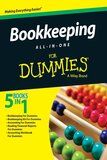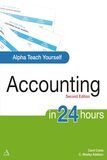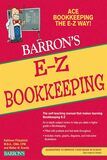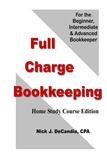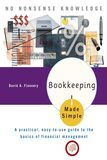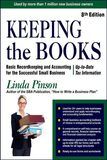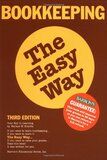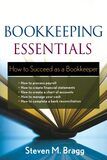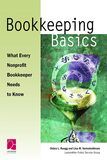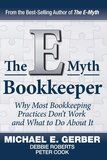Top 10 Bookkeeping Books [2025]
Bookkeeping is the art of recording, storing, and retrieving the financial affairs of an individual, company, or non-profit organization. Below is the list of books for bookkeeping to read in 2025 –
- Bookkeeping All-In-One For Dummies ( Get this book )
- Alpha Teach Yourself Bookkeeping in 24 Hours ( Get this book )
- E to Z Bookkeeping (Barron’s E-Z Series) ( Get this book )
- Full Charge Bookkeeping, HOME STUDY COURSE EDITION ( Get this book )
- Bookkeeping Made Simple: A Practical, Easy-to-Use Guide to the Basics of Financial Management ( Get this book )
- Keeping the Books: Basic Recordkeeping and Accounting for Small Business ( Get this book )
- Bookkeeping the Easy Way (Easy Way Series) ( Get this book )
- Bookkeeping Essentials: How to Succeed as a Bookkeeper ( Get this book )
- Bookkeeping Basics: What Every Nonprofit Bookkeeper Needs to Know ( Get this book )
- The E-Myth Bookkeeper ( Get this book )
Let us discuss each bookkeeping book in detail, along with its key takeaways and reviews.
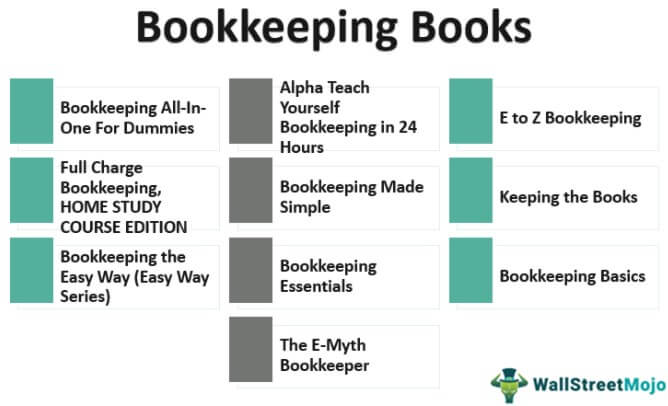
#1 - Bookkeeping All-In-One For Dummies
by Lita Epstein
If you are new to bookkeeping, this is exactly what you need.
Book Review:
This book combines five books on Bookkeeping – bookkeeping for dummies, bookkeeping kit for dummies, accounting for dummies, reading financial reports for dummies, and accounting workbook for dummies. In over 550 pages, this book teaches the readers the lessons they need to learn in bookkeeping with many references and illustrations. So you can use this book as a textbook, and you will also learn the basics of accounting. The best part of this book is that it is very lucidly written, and there is no technical jargon that will veer you off from your self-learning task. Many readers who have gone through this book have mentioned that this book is the thing they were searching for.
Key Takeaways
- This book will teach you fundamentals. This book is written with the average reader in mind, and the author has taken a detailed approach to explain each concept.
- You will not only learn to deal with your daily finances, but you will also learn about double-entry bookkeeping, managing your taxes, reporting profits, making sense of financial statements, and so on, and so forth.
- This book is the ultimate textbook in bookkeeping.
#2 - Alpha Teach Yourself Bookkeeping in 24 Hours
by Carol Costa
You will not learn all of it in a day, but if you keep reading and implementing what you learn from this book, you will be good enough in a few short days.
Book Review:
Now, there are many books on the market. But to appeal to someone who knows nothing about bookkeeping isn't easy. The best part of this book is its arrangement. This book is arranged logically so that you never get confused about the "how" and "why" of bookkeeping. This book is also very comprehensive, keeping in mind the average reader. Every chapter is written in so much detail that one would take around 1.5-2 hours to cover up. And after reading each chapter, you can put the lessons into practice and start taking care of your books immediately.
Key Takeaways
- If you want to learn bookkeeping all by yourself, this is the book you should start with. This book is just 368 pages and, at the same time, very comprehensive. It is a perfect book for small business owners.
- If you want to train your staff (who are unaware of how to manage your books, if at all), present her this book and you will save up a lot of costs on training. This book is easy to read and perfect for DIY people.
#3 - E to Z Bookkeeping (Barron’s E-Z Series)
by Kathleen Fitzpatrick and Wallace W. Kravitz
This book can be a good refresher if you already know bookkeeping.
Book Review:
This book can work as a great supplement to any textbook you choose. It is not very comprehensive, but it only highlights the most important snippets of bookkeeping, which you need to use daily. The best part is that this book doesn’t only talk about significant concepts; it also uses many examples and loads of practical problems. This book is not written like an instruction manual; rather, this book is written as a workbook to use and implement all that you learn in this book. The only pitfall of this book is that a few answers are given wrong. The author/editor needs to look at them to make this book completely error-free and easily digestible.
Key Takeaways
- In this book, you will learn about the journal, ledger, financial statements, special journal entries, and how to apply bookkeeping fundamentals in business scenarios.
- This book also comes up with quizzes at the end of each chapter which helps you judge how much you have learned and assists you in handling bookkeeping in business functions.
#4 - Full Charge Bookkeeping, HOME STUDY COURSE EDITION
by Nick J. DeCandia CPA
If you want to read a bookkeeping manual without putting in a lot of hours, this book is for you.
Book Review:
This book acts as a bridge between bookkeeping knowledge and bookkeeping functions in a job. If you want to be hired for a bookkeeping job, read this book, apply its lessons, and the job will become much easier for you. But this book is not a textbook, and you will be disappointed if you want that sort of complete detail of every concept. So read this book once you are thorough with all the bookkeeping concepts. As per the readers, this book is also not for advanced bookkeepers. It’s for those who have knowledge in bookkeeping and who are at a beginner or intermediate level. However, this book does a good job and provides many forms, schedules, and a brief overview of every topic.
Key Takeaways
- This book provides checklists like "new job checklists," "master calendar," etc., and all forms a bookkeeper would need while maintaining a company's books.
- This book is organized properly – the first 112 pages are arranged to include bookkeeping concepts and appendices. The next 40 pages are kept for study outline. The final 20 pages are articulated to test the readers on the concepts. This book is short and serves the purpose of learning and applying professional bookkeeping.
#5 - Bookkeeping Made Simple: A Practical, Easy-to-Use Guide to the Basics of Financial Management
by David A. Flannery
If you’re scared of numbers, this book will aid you in understanding bookkeeping.
Book Review:
This textbook on bookkeeping is approached from a different point of view. It will teach you bookkeeping so that you can understand the basics of financial management. This book has received mixed reviews. The main pitfall is "typos" and "wrong answers." But still, this book is a good book for people who would like to understand the basics and ease their way up to financial management. This book should be read as a supplementary and not as a textbook. The author has good bookkeeping and financial management ideas, but the layout should be improved. This book will teach you a complete accounting cycle, and it is comprehensive enough to master math in bookkeeping and accounting.
Also, check out this - Learn Basic Accounting in Less than 1 Hour.
Key Takeaways
- You will learn about assets, equities, journal entries, adjustments in accounts, preparing financial statements, petty cash statements, payroll, partnership, and finally, how to close the books.
- Many teachers have used this book as their textbook and created practice tests for their students. This book is pretty good in terms of representing fundamentals, but it is still recommended as a reference book.
#6 - Keeping the Books: Basic Recordkeeping and Accounting for Small Business
by Linda Pinson
As the title suggests, this book is perfect for small business owners.
Book Review:
If you are looking for a book for your start-up/small business, grab this book and start learning. This book will teach you step-by-step how to keep books without being too bogged down. This book is not for advanced bookkeepers and is specially written for those who need help learning bookkeeping from scratch. From the first chapter to the last, it will handhold you, show you basic journal entries and ledger entries, and teach you the basic bookkeeping system. However, you can’t expect too much from this book. You will not learn much about finance/accounting here. This book is an introductory course for people who have no idea about bookkeeping/accounting.
Key Takeaways
- This book is not only useful for small businesses, as an individual, but you can also read this book and teach yourself basic bookkeeping.
- The book's scope is limited; that’s why it's focused on delivery. From preparing journals, and ledgers, analyzing financial statements to setting up a bookkeeping system and planning for taxes, you will learn all the basics you need to learn. Plus, you will also get a fundamental knowledge in cash accounting, accrual accounting, independent contracting, and many worksheets, forms, and formats.
#7 - Bookkeeping the Easy Way (Easy Way Series)
by Wallace W. Kravitz
Amid the many “how-to-do-bookkeeping,” this one stands out.
Book Review:
How can a beginner learn better? When she is presented with short lessons, easy-to-understand language, and a way to implement immediately what she has been learning. This book will do exactly that. Written in short chapters, this book will teach you the double-entry bookkeeping system like no other in the market. Before you ever use Quickbooks software, this book is a must. Without understanding fundamentals, no software will be able to help you. This book also covers topics like merchandising/retailing, which makes it more comprehensive. If you want to learn the fundamentals of bookkeeping, this book is a must-read.
Key Takeaways
- This book is not only applicable to beginners; you can also read through this book if you know bookkeeping and want to use this book as a refresher course.
- This book is not only recommended by accounting/bookkeeping professionals but also by CPAs and business owners who often need to train their subordinates in bookkeeping.
- This book can be a perfect partner if you take a class and use this book as a textbook.
#8 - Bookkeeping Essentials: How to Succeed as a Bookkeeper
by Steven M. Bragg
It’s not a book for beginners but for those already practicing bookkeeping professionally.
Book Review:
So if you are a beginner, do not start with this book. However, if you are an integral part of a team and do bookkeeping regularly, this book can guide you and help you become a better bookkeeper. Every bookkeeper knows the feeling of being compared with a data entry operator. This book will help you understand your tasks and feel important about your job. It is an excellent book if you want to go to an advanced level and understand the pros and cons of bookkeeping. Readers have not only liked this book so much, but they also use it for reference and for creating SOP manuals.
Key Takeaways
- You will not only learn the rules of thumb that you can apply quickly, but you will also learn practical techniques to analyze, evaluate, and solve daily issues in bookkeeping and accounting.
- This book will help you pinpoint what you should look for, what to solve, and how to solve them in this age of constant change.
- You will also get loads of examples, ratios, charts, and explanations.
#9 - Bookkeeping Basics: What Every Nonprofit Bookkeeper Needs to Know
by Debra L. Ruegg & Lisa M. Venkatrathnam
If you want to learn "bookkeeping for nonprofits," this book should be the first book you should read.
Book Review:
There are very few books on non-profit bookkeeping. But among all, this book stands out. According to the readers of this book, it is a great resource for people who don’t have any background in bookkeeping/accounting and who would like to start/run a small non-profit. With this book, you can set up a bookkeeping system and solve all of your bookkeeping issues. Moreover, this book is written in a very lucid language, and the concepts are chunked down into smaller parts so that you can understand them better. This book will also help you apply for a position in a non-profit as a bookkeeper. Read this book, learn the concepts, and start applying what you learn. You will be good to go.
Key Takeaways
- Many non-profits don’t have the funds to hire a trained bookkeeper to care for their books. This book will save you cost and teach you how you can take care of your books in your spare time.
- Along with fundamentals and concepts, you will also receive accounts receivable and accounts payable register, general ledger & financial summary form, and also grant tracking form.
- This book is pretty short compared to other bookkeeping books for non-profits. It is just 128 pages, and you can read it as you go along and apply what you learn when you have time.
#10 - The E-Myth Bookkeeper
by Michael E. Gerber, Roberts Debbie, and Peter Cook
This book will teach you how to start a bookkeeping business without any hassle.
Book Review:
We have only looked at books that allow you to be good at bookkeeping. But this book is different. This book will teach you how to start a bookkeeping business if you are interested. Readers have mentioned that this book is the most practical for self-employed bookkeepers. This book has outlined a system for building a bookkeeping practice from scratch. And you can read this book in two ways. First, you can read it as a textbook, highlighting the important areas and implementing the most relevant ideas. Second, you can read it as a reference system. You can read a chapter, implement the ideas, and then read another chapter and do the same. No matter whatever method you choose to read the book, this book is an invaluable resource for building a bookkeeping business.
Key Takeaways
- This book is a comprehensive guide on bookkeeping practice. If you read one book on bookkeeping practice, this is it.
- This top bookkeeping book is very easy to read. And it is full of practical advice. The authors are experts in the field and know what they’re talking about.
- You can take your bookkeeping business to its next level with this book. Read this book as your go-to guide and implement all that you learn. And you will see that your bookkeeping business is thriving within months.
Among these ten bookkeeping books, you can pick up any book you like. But if you are new to bookkeeping, start with the basic books we have mentioned. Otherwise, you can start reading any advanced or focused books from the above list. Learning is pretty easy when you have the right resources. Don’t you think?
